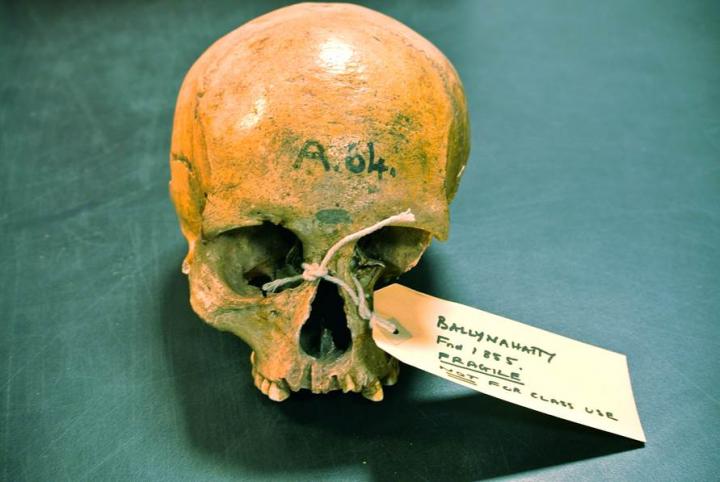Grammatical politics
Geoff Nunberg posted this on his Facebook wall, with the note "Luring the grammar scolds in the Mission":
Read the rest of this entry »
Geoff Nunberg posted this on his Facebook wall, with the note "Luring the grammar scolds in the Mission":
Read the rest of this entry »
It would seem natural that all languages have diminutives, but how diminutives are formed in different languages must vary considerably. In most cases that I'm aware of in Indo-European languages, the addition of a special suffix denoting smallness or connoting endearment is typical, but in other cases there are more complicated mechanisms at play. The most elaborate system of diminutives I know of is Russian, where common given names are not only made into diminutives in irregular ways, they are then profusely elaborated (with some forms indicating doubled diminutiveness): thus, Aleksander –> Sasha, Sashka, Sashen'ka, Sashechka, Sanya, Shura, Sashok. Keeping track of all these variants was always one of the biggest challenges I faced in reading Russian novels.
Read the rest of this entry »
"Scientists sequence first ancient Irish human genomes", Press Release from Trinity College Dublin:

A team of geneticists from Trinity College Dublin and archaeologists from Queen's University Belfast has sequenced the first genomes from ancient Irish humans, and the information buried within is already answering pivotal questions about the origins of Ireland's people and their culture.
The team sequenced the genome of an early farmer woman, who lived near Belfast some 5,200 years ago, and those of three men from a later period, around 4,000 years ago in the Bronze Age, after the introduction of metalworking. […]
These ancient Irish genomes each show unequivocal evidence for massive migration. The early farmer has a majority ancestry originating ultimately in the Middle East, where agriculture was invented. The Bronze Age genomes are different again with about a third of their ancestry coming from ancient sources in the Pontic Steppe.
"There was a great wave of genome change that swept into Europe from above the Black Sea into Bronze Age Europe and we now know it washed all the way to the shores of its most westerly island," said Professor of Population Genetics in Trinity College Dublin, Dan Bradley, who led the study, "and this degree of genetic change invites the possibility of other associated changes, perhaps even the introduction of language ancestral to western Celtic tongues."
Read the rest of this entry »
Alberto Acerbi , Vasileios Lampos, Philip Garnett, & R. Alexander Bentley, "The Expression of Emotions in 20th Century Books", PLOSOne 3/20/2013:
We report here trends in the usage of “mood” words, that is, words carrying emotional content, in 20th century English language books, using the data set provided by Google that includes word frequencies in roughly 4% of all books published up to the year 2008. We find evidence for distinct historical periods of positive and negative moods, underlain by a general decrease in the use of emotion-related words through time. Finally, we show that, in books, American English has become decidedly more “emotional” than British English in the last half-century, as a part of a more general increase of the stylistic divergence between the two variants of English language.
Read the rest of this entry »
On the otoro blog, there is another amazing article about sinograms:
"Recurrent Net Dreams Up Fake Chinese Characters in Vector Format with TensorFlow" (12/28/15)
I say "another amazing article" because, just a week ago, in "Character building is costly and time consuming" (12/22/15), we looked at a fascinating report on the vast amount of labor necessary to build fonts made up of real Chinese characters. Basically, the latter report examined the history of Chinese characters and then explained how typographers create new fonts comprising all the characters necessary for printing books, newspapers, magazines, advertising copy, and so forth.
Read the rest of this entry »
Josh Kosman, "Caesars may sink because of allege $3B typo", New York Post 12/14/2015:
Leon Black’s Apollo Global Management is now defending itself against an alleged typo that could cost up to $3 billion. […]
Caesars in its 2008 debt agreement set conditions that would need to be met so it could strip the guarantee between the parent company and the gaming-operating subsidiary.
In the debt agreement, it says it can strip the gaming subsidiary’s guarantees if: A) it stopped being a subsidiary of the parent, B) the company transferred substantially all of its assets out of subsidiary, “AND” C) it essentially prepaid the bonds.
“There’s no way they satisfied all three conditions,” a source close to the case said, referring to when Caesars stripped the guarantee transferring some of its best assets to newly created divisions and put the subsidiary in bankruptcy.
Caesars claims it meant to say “OR.”
Read the rest of this entry »
For Bob Dylan connoisseurs, the release of The Cutting Edge 1965-1966: The Bootleg Series Vol. 12 is a momentous occasion. It encompasses the studio sessions that gave us the albums Bringing It All Back Home, Highway 61 Revisited, and Blonde On Blonde, and it's available as a 2-CD sampler, a reasonable 6-CD version, and an ultra-comprehensive 18-CD collector's edition for the true Dylan obsessives. The collector's edition, which compiles every outtake from those crucial 1965-66 sessions, may have been released by Columbia primarily for copyright reasons, but for those willing to slog through the 19-hour runtime, there are some unexpected pleasures.
For a Billboard review, Chris Willman listened to the whole 18-CD set in a marathon session. Here's how he describes one track:
Dylan grows increasingly frustrated by how he feels the Hawks are mangling "She's Your Lover Now." "Aw, it's ugly," he says. "I can't. I can't even." Did Bob Dylan just invent the 21st century catchphrase "I can't even"? I think he did!
Read the rest of this entry »
All Synthèse books published before 2005 appear to be free to download in .pdf form from Springer. I haven't verified that this is true for IP addresses outside of universities with a subscription, but I think it is.
This include the series Studies in Linguistics and Philosophy, but there are likely to be other titles of interest to some LLOG readers.
[h/t Kai von Fintel]
This is a photograph of a sign above a urinal at the Tokyo University of Foreign Studies taken by Joseph Williams who was there for a Japanese test. Besides the Japanglish, it's interesting that spaces are added between the words. And there are no kanji.
Read the rest of this entry »
One of Kohei Jose Shimamoto's photos on Facebook:
Read the rest of this entry »
This one's been on my to-blog list for a while. "The Ascent: Political Destiny And The Makings of a First Couple," a "sponsored content" piece for Netflix's series House of Cards prepared by The Atlantic, won both the Judge's Selection and the People's Choice awards for "Best Sponsored Content Editorial" at the Native Creatives:
Read the rest of this entry »
Never mind that it doesn't work, this is the supreme pipe dream for inputting Chinese characters on electronic communication and information processing devices. Of the many thousands of Chinese character inputting systems (see also here and here) that have been devised, some work fairly well and some barely function at all, but this one has to take the cake for being the most ridiculous of all. It is all the more preposterous that initially it was intended for smartwatches with their tiny glass surfaces.
The name of the system gives it away, that is, yībǐyīzì 一筆一字 ("one stroke one character").
Read the rest of this entry »
 If you look up the pronunciation of poinsettia in the dictionary, you'll find two versions, one that follows the spelling in a regular way (/ˌpɔɪnˈsɛ.tɪə/) and one that would more naturally correspond to the spelling "poinsetta" (/ˌpɔɪnˈsɛ.tə/).
If you look up the pronunciation of poinsettia in the dictionary, you'll find two versions, one that follows the spelling in a regular way (/ˌpɔɪnˈsɛ.tɪə/) and one that would more naturally correspond to the spelling "poinsetta" (/ˌpɔɪnˈsɛ.tə/).
A couple of days ago, a journalist contacted me about this. I knew that the word was formed by adding the usual pseudo-Latin -ia to the last name of Joel Roberts Poinsett, just as Clarke Abel's name gave us abelia and William Forsyth's name generated forsythia. And I knew that there is a common (and even dictionary-sanctioned) alternative pronunciation for poinsettia. But why the i-less version of poinsettia and not (for example) a similar version of forsythia?
Read the rest of this entry »